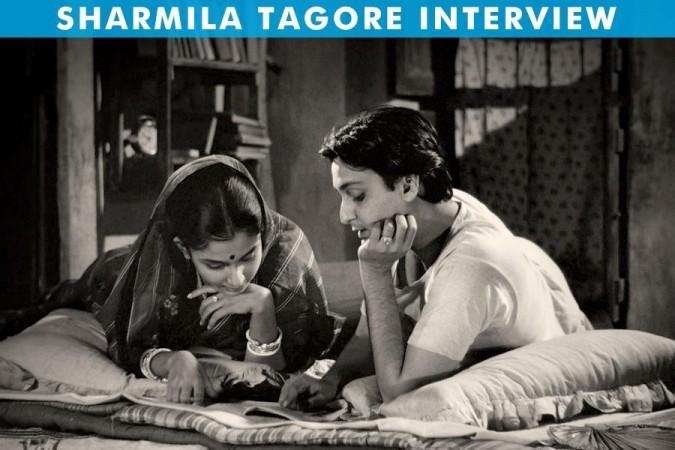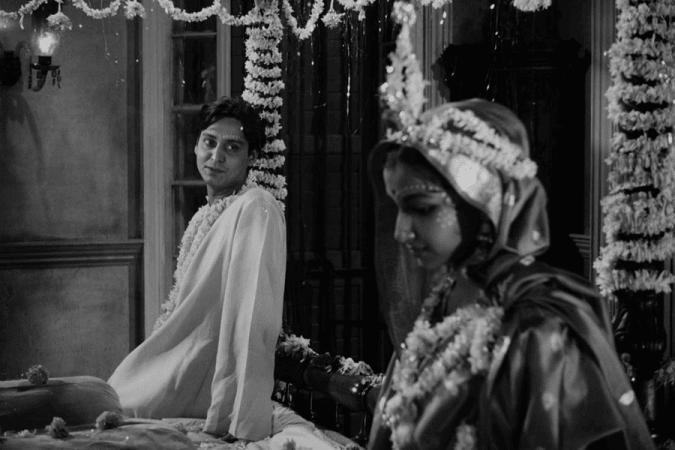Sharmila Tagore has a soft voice. A quality which most cinephiles felt she possessed when she marked her presence in the films of late director Satyajit Ray. She started her career in the film industry at the same time when late actor Soumitra Chatterjee made his debut as an actor. The two actors began their careers as co-stars in Satyajit Ray's Apur Sansar. Both of them later went on to become the most sought after actors in Bengal.
Sharmila Tagore made an extremely successful career in the Hindi film industry, but time and again, she would return to work for Ray. During an exclusive conversation with International Business Times, Sharmila Tagore took some time out to share fond memories with Satyajit Ray and Soumitra Chatterjee.

The death of Soumitra Chatterjee marks the end of an era, which you both started along with director Satyajit Ray.

Yes truly it is an end of an era, because of what he stood for and the kind of dedication (he had), I mean he was different from today's... he worked very differently because he knew so much. He was so interested in so many things like sports, politics, art, language. He was a playwright... he used to recite a wonderful poem. He left a huge legacy of that. It is definitely an end of an era. I have known him for 60 years, so anybody who lived that long (he was 85) he has lived to see a different India, he has seen the evolution of our country, Kolkata, people, I think his knowledge would be so much. He was a thinking person what he recorded in 85 years and output of that in his poetry, writing, and performance will always stay to enrich us."

He has expressed himself in various ways, I have been listening to his poetry, there was so much he had said and he had expressed and even his own somebody was saying that he had released Kabyagrantha, which I haven't read. There is a lot that he has left behind and I'm sure many people will write about him and what we saw yesterday, the procession. So many wishing Feluda as he was known to Bengalis, there was such heartfelt farewell to him, through songs and poetry and everybody walking in silence. There were so much feeling and emotion. Even I was spellbound. There were so many tributes that were poured in. Now we can see and understand what a good human being he was in the field of art."

So Satyajit Ray had an interesting notion about you which he mentioned in his book, 'My Years With Apu'. He wrote 'The Tagores brought their daughter to our flat. She wore a little yellow frock which made her look like she was in her early teens, which in fact she was.' Do you have any such fond memories?
She laughed. For a short span of time we faced network issues on the telephone, hence it was a bit unclear. From what we could gather, she spoke about a sequence from the film, where she was getting married to Apu in Apur Sansar. The sequence of the film which was being shot by Satyajit Ray was taken in long shot. She was probably standing on a stool to match her height with late actor Soumitra Chatterjee so they could be in one frame. Here's what we were able to comprehend while listening to her recorded conversation again.
There was a lovely photograph, which was a long shot, speaking of him (Apu) and I having got married, you know how in Bengal you wear (call disrupted due to connection error). I was standing in long shot, I was standing on a... (call disrupted due to connection error), to be in the frame (call disrupted due to network error )... I called (call disrupted due to connection error)...

Soumitra was always Soumitra, he was always a friend. I never called him Soumitra da, although he was 10 years older than me. But he was always Soumitra (for me). There were lots of beautiful scenes which we enacted together, and I got a very short role in the film, but every scene was memorable, every scene had some poignancy, it's wonderful. I know the dialogue by heart. I mean I saw it recently, these American people had restored. It's such a beautiful print.

Such a pleasure then I saw (another movie) with Soumitra, the young Soumitra, with his smile, that twinkle in his eyes. He was a child at heart, he was curious and he loved chatting, he loved adda, he was not a reclusive person, you know I am somebody, therefore, I have to sit quietly he talked to everybody and made friends. There will be a lot of people who will speak for him now. His adda was so learned. It was not that him talking about where to get the Biriyani, well that too, but even that had a standard. One learnt so much by just listening to him. And when we heard him talk to his equals, it was a pleasure, about poetry, politics. He had a strong conviction that he defended, he stood up for the causes, belief, he would protest. I value the courage of his conviction. So it is not that he would change his opinion. He had values that were long-lasting. He got along very well with the younger generation. He would engage with people. He really celebrated life and he loved his work. I don't think he wanted not to work.

What is it about the Ray era which you want to bring back in today's cinema?
I think Satyajt Ray's influence is very paramount in today's directors. You know culture travels in very mysterious ways. How like you can see Ray's influence on Shyam Benegal and today's directors they probably don't even know that they are influenced by him. That trend that he pioneered changed seeing films from that theatrical mode, a bookish mode he brought in that everyday language. He made it very colloquial and real. Whether his music and background music and style became very real. There are lots of people Shyam Benegal, Gopal, and their followers, have all been affected by Ray's films, in shot taking. But when I see, I don't think...I don't know I might be biased, but I film certain films of Ray are immortal like Apur Sansar, Devi, Charulata, they are so relevant even now.

Thank you so much.
Write well huh. Please don't misquote me. (Smile).


!['Had denied Housefull franchise as they wanted me to wear a bikini': Tia Bajpai on turning down bold scripts [Exclusive] 'Had denied Housefull franchise as they wanted me to wear a bikini': Tia Bajpai on turning down bold scripts [Exclusive]](https://data1.ibtimes.co.in/en/full/806605/had-denied-housefull-franchise-they-wanted-me-wear-bikini-tia-bajpai-turning-down-bold.png?w=220&h=135&l=50&t=40)


!['Had denied Housefull franchise as they wanted me to wear a bikini': Tia Bajpai on turning down bold scripts [Exclusive]](https://data1.ibtimes.co.in/en/full/806605/had-denied-housefull-franchise-they-wanted-me-wear-bikini-tia-bajpai-turning-down-bold.png?w=220&h=135)


![Nayanthara and Dhanush ignore each other as they attend wedding amid feud over Nayanthara's Netflix documentary row [Watch]](https://data1.ibtimes.co.in/en/full/806599/nayanthara-dhanush-ignore-each-other-they-attend-wedding-amid-feud-over-nayantharas-netflix.jpg?w=220&h=135)